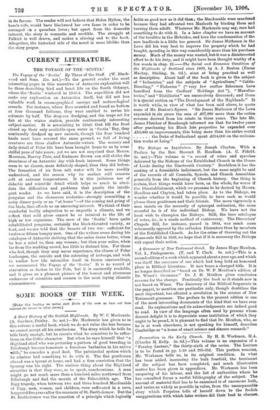CURRENT LITERAT (IRE.
THE VOYAGE OF THE SCOTIA.'
The Voyage of the Scotia.' By Three of the Staff. (W. Black- wood and Sons. 21s. net.)—To the general reader the most interesting pages in this narrative of Antarctic exploration will be those describing bird and beast life on the South Orkneys, where the 'Scotia' wintered in 1903-4. The expedition did not make any exploration on Antarctica itself, but did not less valuable work in oceanographical surveys and meteorological records. For instance, where Ross sounded and found no bottom at four thousand fathoms, they were enabled to revise his estimate by half. The deep-sea dredging, and the traps set for fish at the winter station, provide continuously interesting subject-matter. It is astonishing to think that till the frost closed up their only available open water in 'Scotia' Bay, they continually dredged up new animals, though the four hundred hauls must have covered the same ground, so full of living creatures are these shallow Antarctic waters. The scenery and daily detail of Polar life have been brought home to us by some skilful pens of late years; yet we are not surprised that Messrs. Mossman, Harvey Pine, and Rudmore Brown can still clothe the dreariness of an Antarctic day with fresh interest. Some things seem to us clearer, more definitely shaped, than they did before. The formation of ice from salt water will be more readily understood, and the reason why its surface still remains soft at extreme temperatures. It is this judicious use of didactic and scientific detail which helps so much to eluci- date the difficulties and problems that puzzle the intelli- gent reader. As we have said, it is the description of the penguins and the clamorous rookeries—strongly resembling a noisy dinner party or an "at home"—of the coming and going of the birds, that affords us an unceasing interest. We think of their wonderful bodily adaptation to so ungentle a climate, and we reflect that cold alone cannot be so inimical to the life of high or low organisms. The crew of the 'Scotia' have quite rehabilitated penguins, certainly the black-throated variety, as food, and we are told that the breasts of two wer:. sufficient for twelve or fifteen hungry men. One of the writers avers during his catalogue of Antarctic clothing that the sailor darns better, when he has a mind to, than any woman ; but then your sailor, when far from the madding crowd, has little to distract him. For those who feel, though they may never experience, the charm of Polar landscapes, the sunsets and the colouring of icebergs, and wish to realise how life intensifies itself in frozen surroundings, we recommend The Voyage of the 'Scotia.' It is no record of starvation or dashes to the Pole, but it is eminently readable, and it gives us a pleasant picture of the honest and strenuous endeavour of scientists and seamen in the most trying climatic circumstances.














































 Previous page
Previous page